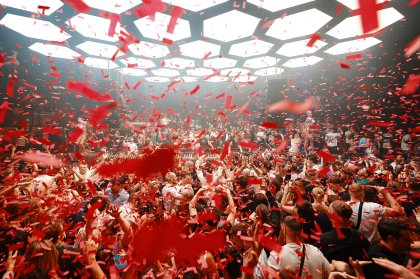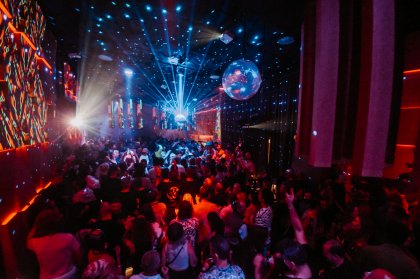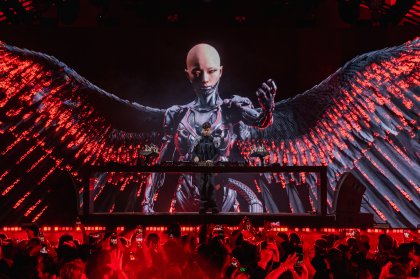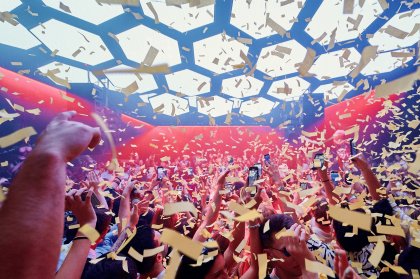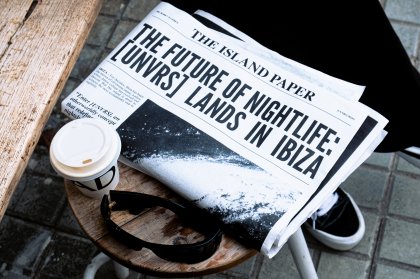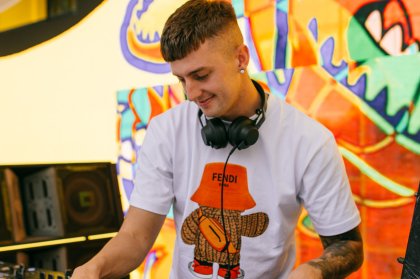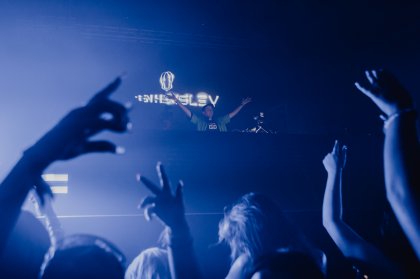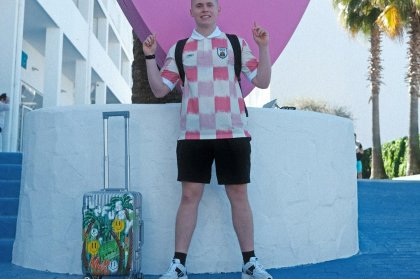
There's a certain level of serenity and confidence that comes with experience, and techno legend Stacey Pullen reeks of the stuff. After over twenty years on the techno trail, having embarked upon it with the aid of Detroit's illustrious three: Derrick May, Juan Atkins and Kevin Saunderson, Pullen is both calmly reflective about the changing scene and yet still deeply passionate about his contribution to it. Having grown up during the Detroit techno movement of the mid-eighties, Pullen has a long and illustrious history of influence which started with a break at Detroit's Transmat Studios, and burgeoned into classic albums like Theory of the Silent Phase, unforgettable monikers like Kosmik Messenger, seminal mixes like his 1996 DJ-Kicks offering and the recently revived Black Flag label.
Nowadays, Pullen has an uncanny knack of nosing about in alternate and more contemporary styles than his own (Marco Carola and Luciano bring him to Ibiza this year), whilst keeping his feet firmly planted in his Detroit techno roots. As a result, he continues to be influential and innovative on the scene and not merely filed under 'classic' in a dusty record shop. It's this – and some practical party measures he think other DJs would do well to adopt – that explain the success of his strive for longevity.
So you're back for Music On – how have those gigs been going so far?
It's been going well. Each time has been getting better and better, you know, I'm kind of happy that I've been ‘the man in the main room,' Marco told me when he first started to do Music On, he said, “I want you to be the man in the main room – I'll take care of the Terrace.” So far it's been good and tomorrow's going to be even better. Usually I'm always closing but here I've been doing different time slots and tomorrow I'm opening.
Do you have a preference?
The thing about it is, when you come into the Music On nights the small room, which is the main room, fills up first. That goes off from 12:30 to 3:30 or 4 o clock and then of course that's when Marco goes on. Then you got the Italian crowd, who all want him and will all flock over to see him... But we've been toying with different time slots and this is the first year so it's been a gradually learning and growing process, but it's been all good actually.
And you've also played a Luciano night…
Yep I played a Luciano night at Ushuaïa about a month ago and that always goes off.
I would have thought that would expose you to a different, maybe younger crowd than usual. Do you approach a set differently knowing that most of the audience might not have seen you before?
Yeah well every gig is different. What worked last night may not work tonight. That's the joy of what we do, we get a chance to improv. or explore different territories. Especially for Luciano's night, you know the whole Cadenza sound… I released a record on Cadenza with Marco Loco and it's a different sound than normally what I do play but, at the same time, me being in the business for over twenty years, I can adapt to every situation.
Have you had the opportunity to play any extended sets in Ibiza recently?
Actually the first Music On after party Marco and I played five hours back to back. And a lot of people don't know that cause the after party got put on at the last minute… but the people who were there were like ‘wow.' And that was pretty much the longest set that I did here – it was with Marco and he's good company to share 5 hours with.
Do you prefer the longer set?
I do prefer the longer set because I get the chance to play a lot of music that I don't get a chance to play normally, because most of the time I'm playing peak-time sets – two hours. And I did the math years ago – two hours is nineteen songs! Nineteen tracks that's it! Depending on how you play, but if you play an average of five minutes a song that's only nineteen songs, twenty songs maximum. And I got a whole computer full of tracks – thousands and thousands of tracks – so me playing the longer sets I get a chance to buy music and play music that is normally just sitting there; tracks that I like and are my personal favourites.
Is there are favourite marathon set that sticks out in your mind from any point in your career?
>laughs< You're going to laugh about this, I can tell because of your Australian accent. It was a gig that I played in Melbourne about ten years ago at Club 7 and I played a twelve hour set. I brought my records, in fact it was the last time I travelled with vinyl because the extra luggage fees that I got charged with for playing twelve hour sets, in Australia, were just astronomical, you know…. Anyway I remember playing a twelve hour set and I remember getting served sushi, at around seven o clock in the morning. >giggles<
Seven o clock in the morning! ‘Cause I was so hungry halfway through my excursion, and I'm like ok I've got five more hours to go… and here I am chewing on some sushi… so that was very memorable, I got served sushi and I'm like ok perfect.
Perfect? That is not the breakfast I would choose!
Well, you know! It's fast…
It's raw…
Hey it's better than eating a full breakfast and getting your hands all dirty, you just stick it in your mouth and move on!

So you've obviously had some pretty high profile mentors when you were breaking onto the scene, do you play that role for anyone now?
I do for a couple of the young guys in Detroit, but most of the guys who are under me there, they pretty much moved on from Detroit. But I still got a couple of guys who still look to me as a mentor, if you will, and I appreciate that cause I was once them. And for me to be able to be in that position to teach and show the young guy the ropes and let him know that it's not all about the money, it's more about being a visionary and an artist first, you know I'm happy to do that. But most of the guys now, they have other inspiration, which is moving out of the city of Detroit, which is what they do. They all go over to Europe.
You're still based in Detroit, what keeps you there?
It's the spirit of the city, you know. Detroit's known for cars, music, which is the Motown sound back in the sixties… there's not really much to do but perfect our craft in Detroit. It's not like it's a major city like New York, LA or Chicago; we have a city that's about seven hundred thousand people in the city limits – and it's actually a city that's built for two million people. We had a lot of economic crises or whatever, but as for the few people that stayed there, we realised we got something special there because we don't wanna go to New York just to try to make it. We don't wanna go to LA to just try to make it; we wanna make it here and be special, so when people make it out of Detroit and get known outta Detroit as well as at home, then it's that much more special. It's not dance music, but guys like Kid Roc and Eminem - every time they travel they always talk about Detroit. I'm doing an interview right now and talking about Detroit. And there's always something special when they talk about the city as well, and I think it's a good thing, because if we all left then it would really be in a bad situation.
Are the things you talk about that make Detroit special still thriving? Have your reasons for staying changed?
Yeah they've changed. It's been an on-going thing since the sixties. We had race riots in sixty-seven and it changed the landscape of Detroit forever; still in my lifetime to this day, it's not what it used to be. But you also have a lot of people that have moved to Detroit recently, because of the opportunities. A lot of companies move to Detroit because they see there's this untapped landscape, this untapped market that they can get into. And a lot of the artists have moved towards the city as well to try to get that community-based artist relationship amongst one another to flourish. We went green a little - with urban farming and things to that aspect. So we've been trying to make a growth spurt within the last ten years as well.
Is the crowd different to play to compared to other parts of the world – is it your favourite crowd?
Yeah Detroit's always my favourite crowd – when I play Detroit I look forward to turning them onto something they don't get a chance to listen to. A lot of us have travelled the world for twenty years or more and we get a chance to have all the influences… but then when we come back home, we kinda stick to the basics, ‘cause Detroit crowd will let you know if you're not on your game, you know. >chuckles<
Have you got in trouble from the home crowd before?
No, but a lot of DJs who have come to Detroit, who are not from Detroit, and the people have read the hype of all these DJs and they come in there and if they don't do so well – they will let you know!
What has been the catalyst for getting Black Flag recordings going again?
From a legal standpoint, I'm able to do it now. It's just one of those major label deal things, you know, to keep the story short I had it tied up with that for ten years. When I signed my major label I released an album there and the whole deal kind of unraveled…. so I got disenfranchised with the industry for a little while. As of a couple of years ago I got the rights back, because that time period had passed, and I decided to pick up the pace a little.
At first Black Flag was just an outlet for my music - sort of what Jeff Mills did with Axis and Moodymann did with KDJ records - I just wanted to be the only artist to release music on the label. And then the second time around, well there's so much music coming out and I enjoy good music and I got a hold of some demos… and it's pretty much simple as that.
The first release has been Sergio Fernandez – and does this mean you'll be doing more of other people's music in future?
Yeah, I already have three more releases from other artists coming between now and the end of the year.
And how do you choose them? Do people approach you, do you need to know them or do you just hear something and think ‘that's it'?
It's been kind of all around. Sergio hit me up on the email and I got back with him and it was on from that point. A couple of the other guys, I charted some of their remixes and charted some of their songs on different charts like Beatport or RA, and they contacted me and said ‘how would you like for me to do something for your label?' So I'm showing them love by charting their record, and they respect me and know my music and they just took the opportunity for themselves to offer music for the label. And it was just the right timing.
And you're still producing yourself?
Oh yeah. >grins<
My new release called Any Which Way probably should be out the beginning of winter. I'm waiting on a remix from a very well known remix producer -
Who?
I can't tell you.
Tell me!
I can't tell you!
Oh ok….. Martin Buttrich is doing a mix for me. I'm waiting for him to give me the mix. But in between then I have Tony D, he's from Italy, he's coming out with an EP on Black Flag. I have Nathan Barato, he's from Toronto, he's coming out with an EP. And possibly some more, I mean I'm getting demos in all the time. I think three on the burner right now is enough for me to concentrate on, not including my tracks, so that should take me into 2013. Also I'm re-releasing some of my back-catalogue and remixing some of my classic tracks on my label.
Is that a weird experience – remixing your own tracks that were made by another you – a you from so long ago?
Yeah, it's strange, but if you make timeless music, you're putting your heart and soul in it regardless if it was two years ago or ten years ago. But it is kind of strange ‘cause you get into a different frame of mind when you going into remixing your own - you're basically communicating with yourself. I'm listening to what I did ten years ago and injecting a new inspiration into from what inspires me now; should be an interesting task though.
For me it's important to strive for longevity. In this business that's the main thing. I hear a lot of these guys talking about ‘oh I'm tired from travelling so much, I gotta get on the plane 3 hours after the gig…' and I'm like well if you don't party so much….! >laughs<
See partying and partying are two different things. Partying is going to a gig and having a good time… and then there's professional partying. And that's what I'm talking about. There are professionals who think they can do it but come one day later they're exhausted from going so hard that night. But I'm a seasoned professional. That's how I've lasted so long.
Teach us your ways…
A lot of water. And fresh orange juice. And sushi at 7 o clock in the morning.
Well – we've been told. Never leave for the club without your chopsticks again.
